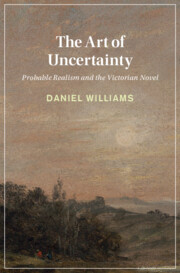Book contents
- The Art of Uncertainty
- Cambridge Studies in Nineteenth-Century Literature and Culture
- The Art of Uncertainty
- Copyright page
- Epigraph
- Contents
- Illustrations
- Acknowledgments
- Introduction
- Part I Provisional Judgments
- Part II Probable Realisms
- Chapter 3 Worlds Otherwise
- Chapter 4 Approximations
- Coda
- Notes
- Bibliography
- Index
- Cambridge Studies In Nineteenth-Century Literature And Culture
Chapter 3 - Worlds Otherwise
Thackeray and the Counterfactual Imagination
from Part II - Probable Realisms
Published online by Cambridge University Press: 29 February 2024
- The Art of Uncertainty
- Cambridge Studies in Nineteenth-Century Literature and Culture
- The Art of Uncertainty
- Copyright page
- Epigraph
- Contents
- Illustrations
- Acknowledgments
- Introduction
- Part I Provisional Judgments
- Part II Probable Realisms
- Chapter 3 Worlds Otherwise
- Chapter 4 Approximations
- Coda
- Notes
- Bibliography
- Index
- Cambridge Studies In Nineteenth-Century Literature And Culture
Summary
As literary realism shed earlier providential paradigms, William Thackeray inaugurated a startling interest in alternatives to reality as essential for novels that would be true to life. These “queer speculations” saturate his writing: a child who might have lived, an accident that could have been avoided, a war that would have ended otherwise if only …. Thackeray’s counterfactual imagination matures from occasional stories of the 1840s, through Vanity Fair (1847–48), the Roundabout Papers (1860–63), and Lovel the Widower (1860). His conditionals range from frenzied anticipation to paralyzing regret, developing from wild wagers and total reversals of fortune in the early sketches to a late style where memory, narrative, and writing itself are marked by virtuality. This chapter examines uncertain experience in Thackeray’s oeuvre in relation to historical writing of the eighteenth and nineteenth centuries and accounts of counterfactual reasoning in psychology and narrative theory. Probing uncertainty’s emotional and tonal modulations, Thackeray’s writing widens the space of novelistic realism to include the nonmimetic, hypothetical, improbable, and open-ended – or what he terms the “might-have-beens.”
Keywords
- Type
- Chapter
- Information
- The Art of UncertaintyProbable Realism and the Victorian Novel, pp. 109 - 151Publisher: Cambridge University PressPrint publication year: 2024

